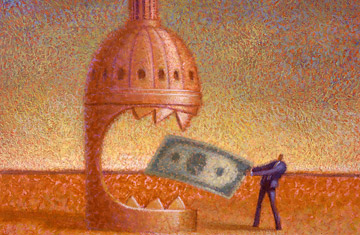
To understand how the credit crunch is hitting American business — and, in turn, you — look no further than the Dog Shop, a pet-supplies and -grooming store in Washington, D.C. This holiday season, owner Jane Huelle will stock only four varieties of Christmas-cookie dog treats instead of the usual six. That's because a month and a half ago she got a letter from her credit-card company saying her line of credit was being docked by thousands of dollars.
Huelle hadn't done anything wrong — she never missed a payment, and her credit score was unchanged — but tighter lending standards across the board meant the safety net she'd counted on for emergencies (a dog-dryer breakdown, say) was suddenly that much smaller. Now, as a precaution, she's cutting outlays, including the money she spends on inventory. "The banks are looking at everyone with a fine-tooth comb," she says. "In terms of the consumer, they're not going to have the same selection or quantity they would have otherwise had."
Treasury Secretary Hank Paulson likes to talk about how soured mortgage-related securities are "clogging up" our financial system. It's not always easy to see what he means. Banks' refusing to lend to one another and companies' not being able to fund themselves through issues of commercial paper are incredibly serious and escalating problems — but almost entirely intangible.
Only in recent weeks have those concerns started to translate to Main Street: retailers stocking less for Christmas, fears that companies won't make payroll. Though some of the direr projections of where the credit crunch may lead are unlikely, the effects are nonetheless filtering down to the average consumer and worker. (See the 10 steps to the financial meltdown here.)
This process, more than a year in the making, shot into overdrive in the wake of the corporate failures and takeovers that began with the collapse of Lehman Brothers on Sept. 15. Less than two weeks earlier, on Sept. 4, the Association for Financial Professionals surveyed more than 350 large companies about how the availability of short-term credit (or the lack thereof) was affecting business. Seventy-one percent said there was no significant impact, 11% said growth had slowed, and only 2% said business had contracted.
The trade group was shocked to see the results of a similar survey they ran three weeks later, between Sept. 26 and 29. Thity-seven percent of companies said that as a result of reduced access to short-term credit, they had cut capital spending during the previous month. Twenty-six percent had frozen or reduced hiring, and 22% had considered layoffs. Ten percent had reduced inventory, and 7% had contemplated closing stores or factories. Workers and customers of the world, those are effects you'll feel.
To be sure, all lending hasn't been wiped off the face of the planet. Community banks, credit unions and firms that lend money against receivables are in many cases booming. Sterling National Bank, a regional player in the Northeast, has taken out newspaper advertisements asking "What Credit Crunch?" and highlighting loans it has recently made — a $5 million revolving line of credit to fund sales growth, $4 million worth of credit and lease-financing to buy IT systems and software.
But it's not just banks — or the commercial-paper market, for that matter — that are the obstacle. Talk to Mike Mitternight, president of Factory Service Agency, which installs commercial air-conditioning systems in suburban New Orleans, and you'll find out that one of his biggest problems is other businesses. Historically, he's gotten paid by contractors within 45 to 60 days. His suppliers, even major manufacturers, used to be amenable to waiting that long to get paid themselves.
No more. Now suppliers, loath to extend credit even to longtime partners, are insisting on cash as quickly as possible, sometimes in as little as 15 days — which strains Mitternight's ability to manage his cash flow. "They're concerned things could go wrong," he says. So is he. Which is why he's decided to keep a tight cap on spending instead of expanding his business. That means $35,000 less juicing of the economy when Mitternight doesn't buy a truck. And it means one fewer job created for an HVAC technician.
Taking all these factors together — and to the extreme — some people (Congressmen included) have suggested that companies might even be at risk of not being able to pay workers. So far, there's little, if any, evidence of that. Automatic Data Processing, which handles paychecks for 400,000 small businesses, dips into its clients' bank accounts to pay their employees. There has been a slight uptick in the number of times there haven't been ready funds, but at this point, that pattern isn't any different from what ADP has observed in previous economic slowdowns.
That illustrates an important point: the line between the problem's being a credit crunch and the problem's being an economic slowdown is blurring. In late September, BDO Seidman, an accounting and consulting firm, surveyed chief financial officers at 100 large retailers and found that 41% had experienced a tightening of credit by their lenders. That finding was set right next to another: that 37% of retailers planned to reduce inventory purchases for the rest of the year. Sounds like Jane Huelle's Dog Shop all over again.
The thing is, on the basis of conversations with retailers, the folks at BDO figure that the vast majority of that 37% drop is due not to firms' inability to finance purchases but but to their anticipating that consumer spending simply won't be there to match.
It may be difficult to articulate what a credit crunch feels like. A recession, on the other hand, most people can explain.
